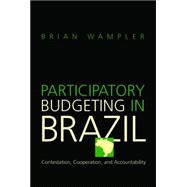
| List of Tables and Figures | p. ix |
| List of Acronyms | p. xi |
| Acknowledgments | p. xiii |
| Extending Citizenship and Accountability Through Participatory Budgeting | p. 1 |
| Participatory Budgeting: Rules of the Game | p. 45 |
| Authority, Negotiation, and Solidarity: PB Delegates' Attitudes and Behaviors | p. 71 |
| Porto Alegre and Ipatinga: The Successful Delegation of Authority and the Use of Contentious Politics (Among Friends) | p. 103 |
| Blumenau and Rio Claro: Weak Mayoral Support and the Absence of Contentious Politics | p. 147 |
| Sao Paulo and Santo Andre: Co-optation, Limited Delegation, and Signaling | p. 175 |
| Belo Horizonte and Recife: Contentious Politics and Mayoral Shifts | p. 215 |
| Deepening Democracy Through the Expansion of Citizenship Rights and Accountability | p. 255 |
| Appendix | p. 283 |
| Bibliography | p. 293 |
| Index | p. 308 |
| Table of Contents provided by Ingram. All Rights Reserved. |
The New copy of this book will include any supplemental materials advertised. Please check the title of the book to determine if it should include any access cards, study guides, lab manuals, CDs, etc.
The Used, Rental and eBook copies of this book are not guaranteed to include any supplemental materials. Typically, only the book itself is included. This is true even if the title states it includes any access cards, study guides, lab manuals, CDs, etc.